 |
 |
 |
Part 3 (back to Part 2) NOVA: What's the island itself like? Is it challenging to shoot there? Howard Hall: There are two kinds of weather on Cocos. Either it's raining or it's getting ready to rain. The island gets over 24 feet of rain a year. I think it's listed as the second wettest place on the planet. On our last trip of 22 days, we had four days when it was partly sunny and 18 days of rain. You haven't seen rain fall hard until you've been to Cocos Island.
Howard Hall: When people see videotape or still images of us working underwater, they often say, 'God, that looks like a lot of fun.' And that's exactly right. It's an adventure, and if people didn't pay me to do it, I'd probably pay somebody so I could go. The work involved in making an IMAX film is 100 percent once you're out of the water, though. There's all the pre-production that goes into securing contracts, planning the film, writing the script, budgeting the whole thing. Once the filming is done, there's six months of post-production work that's equally intense. We're involved in all of it. And when the film is released at the Liberty Science Center in New Jersey, we'll be there to see that they turn the projector on.
Howard Hall: I've been a professional diver nearly all my adult life. I got certified in high school, and I put myself through San Diego State University by teaching scuba diving. I graduated with a degree in zoology, and my plan was to get a doctorate in marine biology. But I began to learn what they do, and it seemed very tedious. So I started looking for other ways to make a living using my diving and perhaps my zoology skills. Underwater photography presented itself. So I started taking still photographs and writing articles, and eventually I was given an opportunity to shoot 16 mm film underwater. That finally led to me producing my own underwater wildlife documentaries. Michele Hall: Before joining Howard full-time in his business, I was a pediatric nurse for 19 years! But I've been diving since 1975, and I started taking still photos shortly after that. Through Howard, I was exposed to the world of filmmaking and knew that it was something that I wanted to get into. I feel extremely fortunate now to have a chance to explore that on a full-time basis.
Howard Hall: There's been talk of another IMAX film, a 3-D film. We've also been offered an opportunity to produce a series for television in the high-definition format, which I think would be very exciting. And I'd like to write a book that would require a lot of underwater photography. There are a variety of opportunities, not the least of which is to do absolutely nothing for a year and a half or so. That appeals to me, actually. Photos: (1,10-12,15) ©Mark Conlin/Howard Hall Productions; (2,16) ©Howard Hall; (3,5-9,13,14) ©Michele Hall; (4) Michele Hall ©1998 NOVA/WGBH Boston/HHP. Cocos Island | Sharkmasters | World of Sharks | Dispatches E-mail | Resources | Site Map | Sharks Home Editor's Picks | Previous Sites | Join Us/E-mail | TV/Web Schedule | About NOVA Watch NOVAs online | Teachers | Site Map | Shop | Search | To Print PBS Online | NOVA Online | WGBH © | Updated June 2002 |
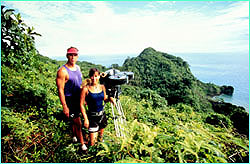 Howard
and Michele Hall high on Cocos.
Howard
and Michele Hall high on Cocos.
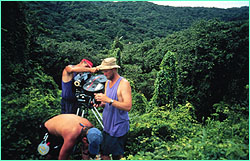 Howard
Hall, Bob Cranston (beige hat), and Billy Holdson on location above Chatham
Bay.
Howard
Hall, Bob Cranston (beige hat), and Billy Holdson on location above Chatham
Bay.
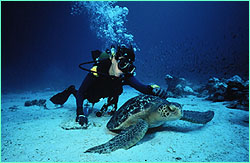 Michele Hall gets
friendly with a green turtle.
Michele Hall gets
friendly with a green turtle.
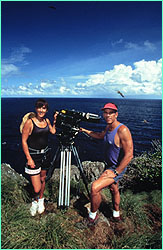 The husband-and-wife team high on Isla Manuelita off Cocos.
The husband-and-wife team high on Isla Manuelita off Cocos.
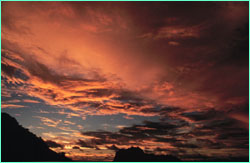 Sunset over
Cocos Island and Isla Manuelita.
Sunset over
Cocos Island and Isla Manuelita.